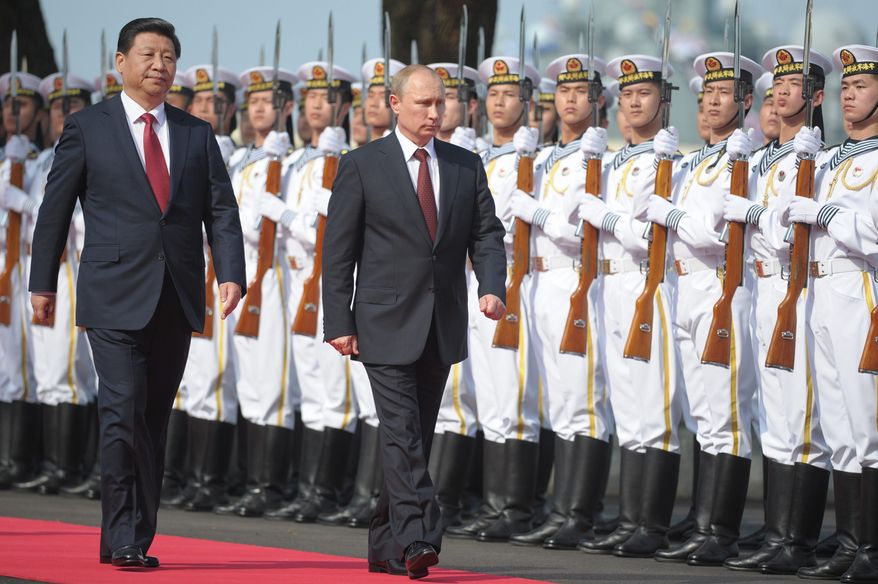
US and Japan Should Not Overreact to Chinese-Russian Joint Military Exercises
(China) on 21 August 2015
by Ling Shengli (link to original)
First, the Chinese-Russian joint military exercise is a key component of the comprehensive strategic and cooperative partnership between the two states. As good neighbors to each other, that partnership touches upon a multitude of fields including politics, military affairs, the economy and culture. As part of the military cooperation between the two nations, joint military exercises help consolidate and develop the larger relationship, and by deepening practical and amicable cooperation, they augment each military's capability to respond to maritime security threats. As the relationship between China and Russia grows more intimate, such military exercises will become commonplace. This particular exercise is the second segment of Joint Sea 2015, the first having been staged in the Mediterranean Sea in May. Thus, the second segment was decided upon long ago, and has little to do with recent developments in the Asia-Pacific security landscape.
Second, the United States is abusing a double standard by distorting the exercise into something it is not. Whether between allies or non-allied nations, joint military exercises held in observance of the relevant United Nations standards should be free of censure. China and Russia are not allies, and officials from both governments have explicitly stated that the two nations will not form an alliance, but this does not have any bearing upon their continued military cooperation. The United States has more military allies and bases, and leads or participates in more joint military exercises than any other nation around the world, and those exercises are furthermore held not just with allies, but with non-allied states as well. Due to the importance of implementing its pivot to Asia strategy, the United States will need to increasingly rely upon the support of its allies, but at the same time it does not wish to see those allies come to blows with China and Russia, and consequently finds itself in a difficult position. This Chinese-Russian joint military exercise is a prime example of this, with the United States being obligated to take Japan's side while simultaneously making known its desire that that regional disputes should not escalate.
Third, as 2015 marks the 70th anniversary of the end of World War II, Japan should do more to reflect upon its own behavior instead of grousing about Chinese-Russian military exercises. The Japanese reaction to this particular exercise has been somewhat sensationalist, to say the least. In the past, Chinese-Russian exercises were mostly limited to one per year. The reason that the two nations have broken from the norm to split the 2015 exercise into two segments, one prior to and one following the two nations' military reviews, is closely linked to the aforementioned anniversary. China and Russia have expressed on multiple occasions their desire to preserve the result of the hard-won victory during World War II, and therefore staunchly oppose any action taken that misrepresents the judgments made at Nuremberg or by the International Military Tribunal for the Far East. To a certain degree, this year's joint military exercise demonstrates China and Russia's strength and resolve in that regard. Despite being an aggressor during World War II, Japan has not engaged in deep self-reflection or issued a sincere apology for the suffering inflicted upon other nations, but instead has worked to unfetter the Japanese Self-Defense Forces and accelerate the pace of its military buildup. Clearly, it is less than fair for Japan to criticize Chinese-Russian joint military exercises.
Although the international community has been informed of the areas of operation set for the military exercise, it would be best if other nations do not engage in close reconnaissance, lest security mishaps occur on the sea or in the air. In fact, therein exists an enormous gray area, as the active monitoring of other nations' military exercises is extremely commonplace, but brings with it inherent dangers. One hopes that the United States and Japan will merely observe this time around and refrain from making any closer contact.
Author Ling Shengli holds a doctorate from China Foreign Affairs University's Institute of International Relations and is a Haiwai Net columnist.

China can relax. The U.S. may observe your joint exercise, but it is not a big deal to anyone. Good luck with any pseudo-alliance with an unstable and pariah Russia. It would be negligible compared to the U.S. and its alliances with all the great democracies of the world